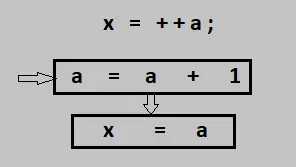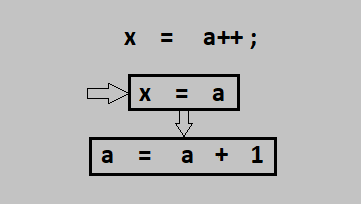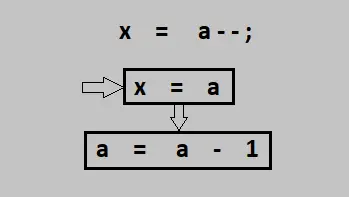# Java Programs
Java Basic
➤ Introduction to Java
➤ Java Editions & Concepts
➤ JDK JRE JVM JIT in Java
➤ How to Run Java program
➤ Java Hello World program
➤ How to set the Java path
➤ Classpath Environment
➤ Tokens in Java Language
➤ List of Java Keywords
➤ Identifiers in Java
➤ Data types in Java
➤ Float & double in Java
➤ Literals in Java
➤ Escape Sequence In Java
➤ Unicode character set
➤ String data type in Java
➤ Arithmetic operators in Java
➤ Increment and Decrement
➤ Comments in Java
➤ Java Naming Conventions
➤ Static Import in Java
Increment and decrement operators in Java are also known as unary operators because they operate on a single operand. The increment operator (++) adds 1 to its operand and the decrement operator (–) subtracts one.
| Operator | Meaning |
| ++ | Increment Operator |
| — | Decrement Operator |
Syntax:-
++variable; // pre increment operator
variable++; // post increment operator
--variable; // pre decrement operator
variable--; // post decrement operator| Expression | The initial value of a | The final value of a | Value of x |
| x = ++a | 4 | 5 | 5 |
| x = a++ | 4 | 5 | 4 |
| x = –a | 4 | 3 | 3 |
| x = a– | 4 | 3 | 4 |
Increment operators (++)
Pre-increment operators in Java (++a)

- First, the value of the variable
aincremented by 1 and store in the memory location of variable a. - Second, the value of variable
aassign to the variable x.
class PreIncrementOperator{
public static void main(String[] args) {
int a, x;
a = 10;
x= ++a;
System.out.println("a: "+a);
System.out.println("x: "+x);
}
} Output:-
a: 11
x: 11
Post-increment operators in Java (a++)

- First, the value of the variable
awill assign to the variablex. - Second, the value of the variable
awill be incremented by 1 and store in the memory location of the variablea.
class PostIncrementOperator{
public static void main(String[] args) {
int a, x;
a = 10;
x = a++;
System.out.println("a: "+a);
System.out.println("x: "+x);
}
} Output:-
a: 11
x: 10
Decrement Operators ( -- )
Pre-decrement operator in Java ( --a )

- First, the value of
adecremented by 1 and store in the memory location of variablea. - Second, the value of the variable
aassigned to the variablex.
class PreDecrementOperator{
public static void main(String[] args) {
int a, x;
a = 10;
x = --a;
System.out.println("a: "+a);
System.out.println("x: "+x);
}
}Output:-
x: 9
y: 9
Post-decrement operator in Java ( a-- )

- First, value of variable
awill assign to the variablex. - Second, the value of
adecremented by 1 and store in the memory location of the variablea.
class PostDecrementOperator{
public static void main(String[] args) {
int a, x;
a = 10;
x = a--;
System.out.println("a: "+a);
System.out.println("x: "+x);
}
}Output:-
a: 9
x: 10
Limitations
The increment and decrement operators in Java can be applied to every primitive data type except boolean. But there are some limitations are there.
1) The Increment and decrement operators in Java only applied on variables (except final variables). It doesn’t work with constant values and final variables. If we try to use increment/decrement operators on constant values or final variables, then we will get a compile-time error.
10++; //Compile time error: unexpected type
++10; //Compile time error: unexpected type class Operators{
public static void main(String[] args) {
System.out.println(++9);
System.out.println(9++);
}
}> javac Operators.java
Operators.java:3: error: unexpected type
System.out.println(++9);
^
required: variable
found: value
Operators.java:4: error: unexpected type
System.out.println(9++);
^
required: variable
found: value
2 errors
class FinalVariables{
static final int a = 5;
public static void main(String[] args) {
System.out.println(++a);
System.out.println(a++);
}
}> javac Operators.java
Operators.java:4: error: cannot assign a value to final variable a
System.out.println(++a);
^
Operators.java:5: error: cannot assign a value to final variable a
System.out.println(a++);
^
2 errorsFinal variables are also constant because after the initialization value of the final variable can’t be modified. So, increment/decrement doesn’t work with final variables.
2) Nesting of increment and decrement operators in Java is not allowed.
Guess the output of the below program.
class Operators {
public static void main(String[] args) {
int a = 5;
int x = ++ (++a);
System.out.println(x);
}
}We will get a compile-time error because the nesting of the increment and decrement operators is not allowed. In this program, due to ++a the value becomes 6, and now the operation is int x=++6; which is invalid.
3) Increment and decrement operators in Java don’t work on boolean and String data types.
boolean bo = true;
bo++; //compile time error:- bad operans boolean
String s1 = “a”;
s1++; //Compile time error:- bad operans String
4) The Increment and decrement operators also doesn’t work on an object reference.
class A{}
class IncDecOperator{
public static void main(String[] args) {
A a1 = new A();
a1++;
int[] ia = new int[5];
ia++;
}
}IncDecOperator.java:5: error: bad operand type A for unary operator '++'
a1++;
^
IncDecOperator.java:8: error: bad operand type int[] for unary operator '++'
ia++;
^
2 errorsSome Important points on increment and decrement operators in Java
After increment and decrement, the data type of variable doesn’t change. For example:- If the variable was char data type then after increment/decrement it remains char data type.
class Operators {
public static void main(String[] args) {
char ch = 'x';
System.out.println(++ch);
}
}Output:-
y
class Operators {
public static void main(String[] args) {
double a = 5.9;
System.out.println(++a);
}
}Output:-
6.9
class IncDecOperator{
public static void main(String[] args) {
int x = 10;
x++;
System.out.println("x++: "+x);
++x;
System.out.println("++x: "+x);
long l = 20;
l++;
System.out.println("l++: "+l);
float f = 50.0F;
++f;
System.out.println("++f: "+f);
double d = 9.0;
d++;
System.out.println("d++: "+d);
char ch = 'a';
ch++; //Or, ch = (char)(ch+1)
System.out.println("ch++: "+ch);
byte b = 1;
++b; //Or, b = (byte)(b+1)
System.out.println("++b: "+b);
b = 127;
b++; //Or, b = (byte)(b+1)
System.out.println("b: "+b);
}
}Output:-
x++: 11
++x: 12
l++: 21
++f: 51.0
d++: 10.0
ch++: b
++b: 2
b: -128
Increment and decrement operators in Java exercises
Find out the output of the below programs?
Program1
class PostOperator{
public static void main(String[] args) {
int x = 10;
x++;
System.out.println("x: "+x);
int y = 10;
y--;
System.out.println("y: "+y);
}
}Output:-
x: 11
y: 9
Program2
class IncrementOperator1{
public static void main(String[] args) {
int x = 1;
System.out.println("Hi-"+ x++);
System.out.println("x: "+ x);
x = 1;
System.out.println("Hi-"+ ++x);
System.out.println("x: "+ x);
}
}Output:-
Hi-1
x: 2
Hi-2
x: 2
Program3
class IncrementOperator2{
public static void main(String[] args) {
int x = 10;
int y = ++x;
System.out.println("x: "+ x);
System.out.println("y: "+ y);
x = 10;
y = x++;
System.out.println("x: "+ x);
System.out.println("y: "+ y);
}
}Output:-
x: 11
y: 11
x: 11
y: 10
Program4
class IncrementOperator3{
public static void main(String[] args) {
int x = 10;
x = ++x;
System.out.println("x: "+ x);
x = 10;
x = x++;
System.out.println("x: "+ x);
}
}Output:-
x: 11
x: 10
Program5
class IncDecOperator{
public static void main(String[] args) {
int x = 1;
int y = x++ + ++x;
System.out.println("x: "+ x);
System.out.println("y: "+ y);
System.out.println();
x = 1;
y = x++ + ++x + x++ + x-- + --x + ++x;
System.out.println("x: "+ x);
System.out.println("y: "+ y);
System.out.println();
x=1;
y = ++x + --x - x-- + x++ - ++x;
System.out.println("x: "+ x);
System.out.println("y: "+ y);
}
}Output:-
x: 3
y: 4
x: 3
y: 16
x: 2
y: 0
If you enjoyed this post, share it with your friends. Do you want to share more information about the topic discussed above or do you find anything incorrect? Let us know in the comments. Thank you!